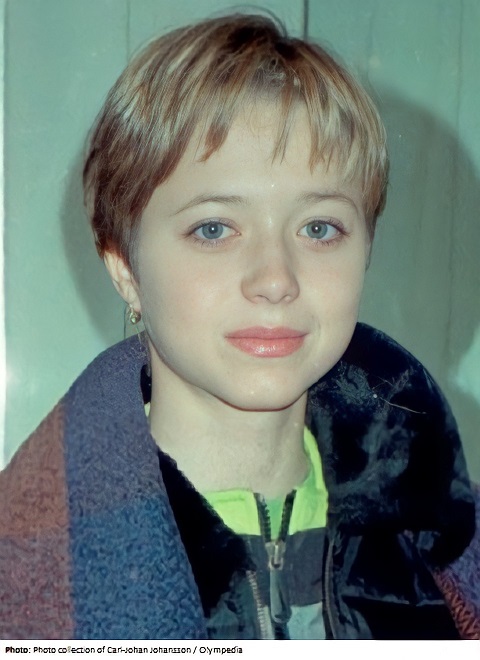
| Roles | Competed in Olympic Games |
|---|---|
| Sex | Female |
| Full name | Yelena Viktorovna•Berezhnaya |
| Used name | Yelena•Berezhnaya |
| Original name | Елена Викторовна•Бережная |
| Other names | Jeļena Berežnaja, Elena Berezhnaia |
| Born | 11 October 1977 in Nevinnomyssk, Stavropol Kray (RUS) |
| Measurements | 154 cm / 42 kg |
| Affiliations | Yubileiny Sport Club |
| NOC |  Latvia Latvia  Russian Federation Russian Federation |
| Medals | OG |
| Gold | 1 |
| Silver | 1 |
| Bronze | 0 |
| Total | 2 |
Yelena Berezhnaya took up skating at the age of four and switched from singles to pairs at the age of 13. After unsuccessfully teaming up with Aleksandr Ruchkin, her coach’s son, Berezhnaya teamed up with Latvian Oļegs Šļahovs and they skated together more than five years. The partnership went well at first, but soon Šļahovs started to become physically and verbally abusive and showed the first signs of mental instability that later put him in a mental hospital. Due to Šļahovs’ conflicting nature, the pair also trained without a coach for most of their career. Despite that, they finished eighth at the 1994 Olympic Winter Games, were seventh at both the 1994 and 1995 World Championships and fifth at the 1995 European Championships. They also won the 1995 Trophée de France.
But on 9 January 1996, Berezhnaya was seriously injured when Šļahovs’ blade sliced into her skull while the pair were practicing a side-by-side camel spin. Two surgical operations were performed to remove bone fragments from her brain and the accident caused partial paralysis on her right side, and doctors were unsure if she would walk again. She also briefly lost the ability to speak.
But Berezhnaya made an unusually quick recovery, being nursed by Anton Sikharulidze, with whom she had became romantically involved a year earlier. Berezhnaya and Sikharulidze started training together in November 1996 and soon rose to be one of the top pairs in the World. They won Olympic gold in 2002 and silver in 1998. They were also World Champions in 1998 and 1999, taking silver in 2001. They also won European titles in 1998 and 2001 and a European Championships bronze in 1997. The pair initially won the 2000 European Championships, but were later stripped of their medals after Berezhnaya tested positive for pseudoephedrine. She had taken cold medication approved by a doctor but had failed to inform the ISU as required and as a result they were disqualified from sports for three months from the date of the test. The pair also missed the World Championships that year as a result of the disqualification.
After the 2002 Winter Olympics, Berezhnaya and Sikharulidze retired from competition and from 2002-06 toured together with Stars on Ice. Berezhnaya married a formed British figure skater Steven Cousins in 2007 and later appeared on numerous Russian ice TV-shows like Star Ice, Ice Age, Kings on Ice and Ice Heart. In 2010 and 2011 she played Queen White in an Alice in Wonderland ice show and in autumn 2011, Berezhnaya participated in the third season of the Canadian reality program Battle of the Blades. She also coached at the Yubileyny rink in Saint Petersburg.
| Games | Discipline (Sport) / Event | NOC / Team | Pos | Medal | As | |
|---|---|---|---|---|---|---|
| 1994 Winter Olympics | Figure Skating (Skating) |  LAT LAT |
Jeļena Berežnaja | |||
| Pairs, Mixed (Olympic) | Oļegs Šļahovs | 8 | ||||
| 1998 Winter Olympics | Figure Skating (Skating) |  RUS RUS |
Yelena Berezhnaya | |||
| Pairs, Mixed (Olympic) | Anton Sikharulidze | 2 | Silver | |||
| 2002 Winter Olympics | Figure Skating (Skating) |  RUS RUS |
Yelena Berezhnaya | |||
| Pairs, Mixed (Olympic) | Anton Sikharulidze | =1 | Gold |